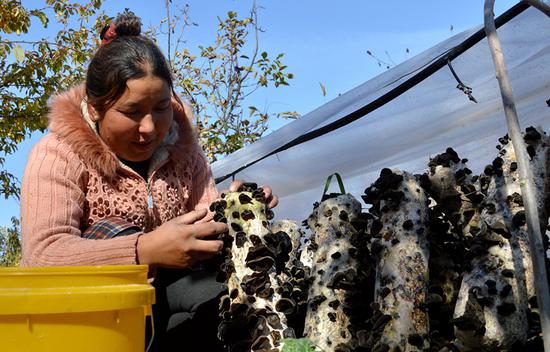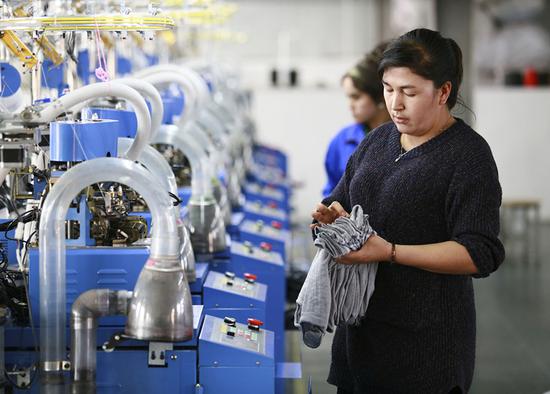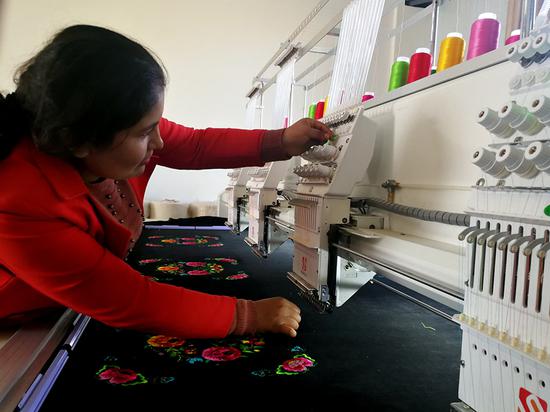
A woman from Wushi county, Aksu, harvests edible black fungus. (Photo Provided To China Daily)
The lives of residents of four areas in western China are improving thanks to targeted measures.
Tunisakhan Juma and her neighbors in Towankh Magget village spend their days taking care of rows of enormous plastic grow tubes in their fields. The tubes contain logs made from pulped walnut branches that are covered with wood ear, an edible black fungus that is rich in vitamin K.
In about four months, the fungus crop will be harvested, bringing a profit of 500,000 yuan ($72,000) to about 200 people in 64 impoverished families in the poverty-stricken village in Wushi county, Aksu prefecture, Xinjiang Uygur autonomous region.
The county, which covers 9,082 square kilometers, has a population of about 235,000, with about 94 percent being members of ethnic groups, including Uygur and Kyrgyz people.
Local farmers used to grow walnuts for a living, but the high level of salinity in the soil and a high water table that often left the ground waterlogged resulted in unstable yields and fluctuating annual incomes.
A poor transportation and distribution network makes it difficult for the locals to sell their agricultural produce and exacerbates low incomes. In some areas, the harsh natural environment makes further development almost impossible.
Last year, the regional government sent a poverty alleviation team to the village.
"We needed to turn the disadvantages into advantages," said Li Keqiong, head of the team. They discovered that the village, with its cool climate and abundant water resources, was suitable for commercial cultivation of the edible fungus.
Impoverished communities
Government data shows that there were about 1.9 million impoverished people in Xinjiang in January, with more than 1.6 million of them living in extreme poverty in four southern prefectures: Kashgar, Hotan, Aksu and the Kezilesu Kirgiz autonomous prefecture.
The prefectures lie on the edge of the Taklimakan Desert, the largest desert in China and the second-largest shifting sand desert in the world. Local living standards have been below the poverty line for decades as a result of the changeable weather and erratic crop yields.
Raising living standards in the four prefectures is crucial to China's objective of eradicating rural poverty by 2020, but it poses a great challenge for the regional government.
Pushing forward poverty alleviation work in Xinjiang has always been difficult, and that is still fundamentally the case, according to a statement released on Tuesday by the Xinjiang Poverty Alleviation Office.

Workers check socks made at a factory built to create jobs for people in Kuqa county, Aksu prefecture, Xinjiang Uygur autonomous region.(Photo/Xinhua)
Most people living in deep poverty in the four prefectures are rural residents, and many are members of ethnic groups with limited education. Many also have chronic illnesses associated with their lifestyles (such as tuberculosis and iodine deficiency), the statement said.
This year, the regional government initiated a three-year poverty-relief plan targeting the four prefectures, with the aim of lifting 400,000 people out of poverty by the end of December.
Growing riches
"I thought black fungus came from the sea, and it was impossible to grow, but after being encouraged by the team, I decided to try," said Tunisakhan, who earned 11,000 yuan last year from cultivating the fungus.
When they grew walnuts for a living, the villagers had to prune the trees to help them grow. They stored the severed branches in their yards.
When the poverty alleviation team arrived, they noticed the fungus growing on the branches, and realized that cuts in the bark provided the perfect breeding ground, Tunisakhan said.
In response, the team provided machines to pulp the tree branches. The pulp is made into logs and wrapped in damp plastic sheeting to create an environment where the fungus can multiply. The "bacteria sticks", as the villagers call them, are then stored in the grow tunnels to prevent rapid evaporation.
"Instead of growing walnuts, we now break tree branches to make the bacteria sticks. It's natural, and means the fungus can be produced at a reasonable cost," Tunisakhan said.
Liu Guorong, deputy director of the poverty alleviation office in Aksu, said growing fungus is a way of creating value out of waste in Wushi, which was designated a national-level poverty-stricken county in 1994.
The northwestern part of the county, which is surrounded by mountains, shares a 137-kilometer border with Kyrgyzstan. The total area of cultivated land is 30 million hectares and the per capita area of cultivated land is 1,553 square meters.
"The soil is very thin and contains many small rocks, so the area of cultivated land per family is very low," Liu said. "Before, walnuts were the main cash crop and the only source of income for many farmers."
Poverty is also responsible for the low level of education and poor health care provision in Wushi, and families can easily fall into poverty if a member becomes ill or is injured in an accident, according to Liu.

Atkam Mamat, from Yakhrik village, Wushi, operates a machine in an embroidery factory, where she trains new members of staff. (Photo/China Daily)
In addition to growing fungus, the main method of poverty reduction is to help people find full-time employment, stable incomes and valuable skills, she added.
According to the poverty alleviation office in Aksu city, the local government has arranged for 7,900 people to work in factories outside the county.
A new start
In August, Abudushukur Karem, his wife, son and daughter, from Wushi's Ahya village, started working in a textile mill in Aksu city, making a combined monthly income of 11,800 yuan.
"In the past, farm work was arduous but paid little. Our lives are much better now, and we are considering settling down in the city," Abudushukur said.
The family is an exception, according to Liu, who said many people from ethnic groups who cannot speak Mandarin or are poorly educated are unwilling to leave their hometowns. Moreover, some people are unable to work outside the county as they have to care for aging parents or young children.
In response, the Aksu poverty alleviation office is encouraging factories to relocate to Wushi to provide opportunities for people who cannot leave the county, she added.
In August, a man named Burhan, who owns an embroidery factory in Hami city in eastern Xinjiang, opened a similar facility in Wushi. "There are many young people who are quick to learn and eager for a job here," he said.
Before opening his new venture, Burhan selected a number of women from Wushi to work as instructors. On June 8, Atkam Mamat, 24, and seven other women from Yakhrik village in Wushi traveled to Hami. It was the first time she had left Wushi.
Having spent two months in Burhan's factory in Hami learning how to operate the embroidery machines, they started work in the plant in Wushi.
Now, 50 women work in the new factory, all being taught by the eight original employees, Burhan said.
"I always wanted a job, but I couldn't leave the village because of my young child and elderly parents," said Atkam Mamat, who earns 2,000 yuan a month.
"When I was told there was a chance to learn a skill and get a stable job in the village, I grabbed it," she said.
Last year, the per capita income of Wushi's farmers rose to 9,089 yuan from 6,550 yuan in 2014, and the figure is expected to reach 10,198 yuan this year, according to the poverty alleviation office.
It noted that between 2014 and last year, 45,770 people from about 11,450 families were lifted out of poverty.
Wushi still has 4,697 impoverished families, but 1,297 of them are expected to climb above the poverty line this year, while the remainder will follow suit next year.
"We are confident that Wushi will reach its goal, thanks to the new factories that have created more jobs," Liu said.
"The most important thing is the change in the people. They are more motivated to strive for better lives, and the people who succeed set a good example for those left behind."
In addition to teaching workers, Atkam is now head of human resources at the embroidery factory.
"A new life is ahead," she said.
